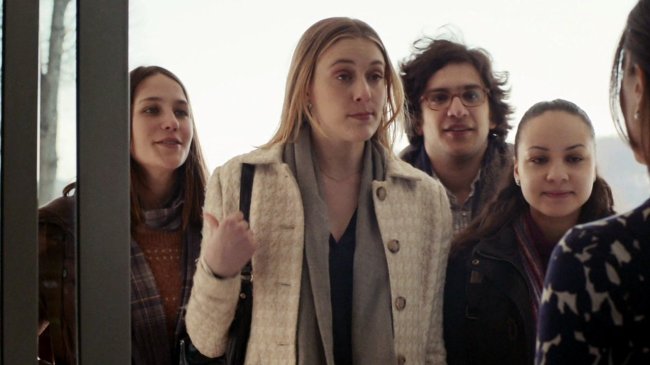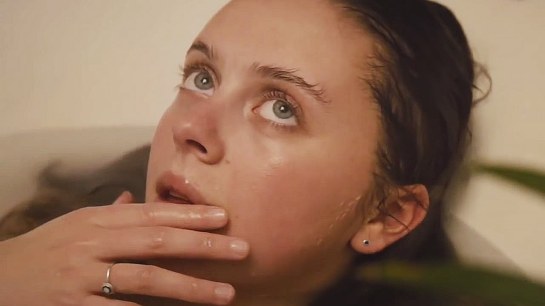
The Women of the August Indies
A trio of compelling films about interesting women have been released in the past few weeks. Queen of Earth, Mistress America and The Diary of a Teenage Girl each feature unique, complex females and those in their lives that are the same.
The best of the bunch is Queen of Earth, the fourth feature in the ever-impressive filmography of Alex Ross Perry (The Color Wheel, Listen Up Philip). It stars Elisabeth Moss and Katherine Waterston as best-friends/bitter-enemies whom find themselves spending two very different summers together in a remote lake house. The picture is one of reflection, with these two actresses reacting to a flipped situation in each of the two trips. The first finds Moss giddily giving googly-eyes to her boyfriend as Waterston longs for a quiet weekend with her longtime best-y. The second has Waterston enjoying affection from a man (a terrific Patrick Fugit) who has no time for the pretenses and anxieties Moss has developed after her recent break-up.
Perry’s movie is tightly drawn to the point of maniacal, strapped to the back of Moss as a woman amidst an emotional breakdown. With lengthy takes, barbed dialogue and ever-present close-ups, Queen of Earth features two people capable of helping and hurting one another in a manner that is only possible when a pair has known one another for ages. Moss is dynamite, shouting and crying to a degree that goes beyond unnerving and tips into pitiful. Watching Waterston, baring all of the baggage of this friendship, stare at Moss in disbelief, desperate to help, yet still bitter at the history that hangs on the edges of the frame, is one of the year’s great joys. Moss is easy to praise and deserving of much acclaim. It’s a bit of acting that requires the nuance and raw reactions of Waterston to reach full impact.
Mistress America is lighter fare, if still somewhat of a slap to the face at times. For a Noah Baumbach movie, it definitely tips into the soft side ala Frances Ha, which befits its origin. Working with Greta Gerwig as a screenwriter/actress again, Baumbach’s second 2015 effort after the solid, if not great, While We’re Young features Lola Kirke as a freshman from the New Jersey suburbs wrestling with a bevy of new life choices while going to school in New York City. Kirke, lost in a world of options and rejection, reaches out to her future sister-in-law Gerwig, a dreamer whose longings tip along the scale of naïve and ridiculous.
This is a quick-witted comedy, with plentiful banter that eventually swarms scenes with a variety of characters, both central and peripheral to the narrative. While Kirke and Gerwig are the stars of the show, those that orbit their lives soon get drawn into the fray. Kirke’s could-be love interest, said interest’s girlfriend are amongst the damage, creating an amusing, jealous and confusing love-triangle. For Gerwig, whose performance is as high-strung as can be, she totes along her ex-boyfriend, his wife, their neighbor and pregnant book-club. If it sounds absurd, you’d be on the money. Baumbach’s direction and his script with Gerwig finds the sweet-spot between outrageous and real.
You feel for Kirke and Gerwig’s ups and downs, even if the interactions are bizarre. A shared drink between the two is host to one of the movie’s finest moments, as an ex-classmate of Gerwig tears into her for being a bully in high-school. It begins with excitement from Gerwig over a rekindling of old times, to bewilderment at the classmate’s accusations to open hostility at the person still hanging onto a decade-old grudge; each emotional evolution growing more and more humorous.
Which brings us to The Diary of a Teenage Girl, a film I still haven’t quite figured out. It’s assuredly acted and directed, with a breakout performance at the center of it by Bel Powley as Minnie, the titular teenager living in 70s San Francisco. Minnie sleeps with an older man (Alexander Skarsgard), who also happens to be her mom’s (Kristen Wiig) boyfriend. Minnie drinks. Minnie smokes. Minnie does drugs. It isn’t an afterschool special though. First time director Marielle Heller, who adapted Phoebe Glockner’s graphic novel, isn’t out to judge Minnie. On some levels, this is your pseudo-typical teen getting into a bit of trouble in the city. Powley is having a grand time learning about her body, how it feels with a man and the power if imbues in her. She equally sells the fresh anxieties and obsessions.
Yet, the last act does tip into the realms of the aforementioned afterschool special. Without going to deep into details, Minnie’s life does head for a spiral and the beats it hits along the way ring of rote. Glockner has stated her novel bares some resemblance to her own past. Is that enough of an excuse though? Do the facts of a situation negate the way they turn a story into something familiar? Personally, a second go-around with the material is needed, which I don’t mind doing since the first trip was mostly worthwhile.

